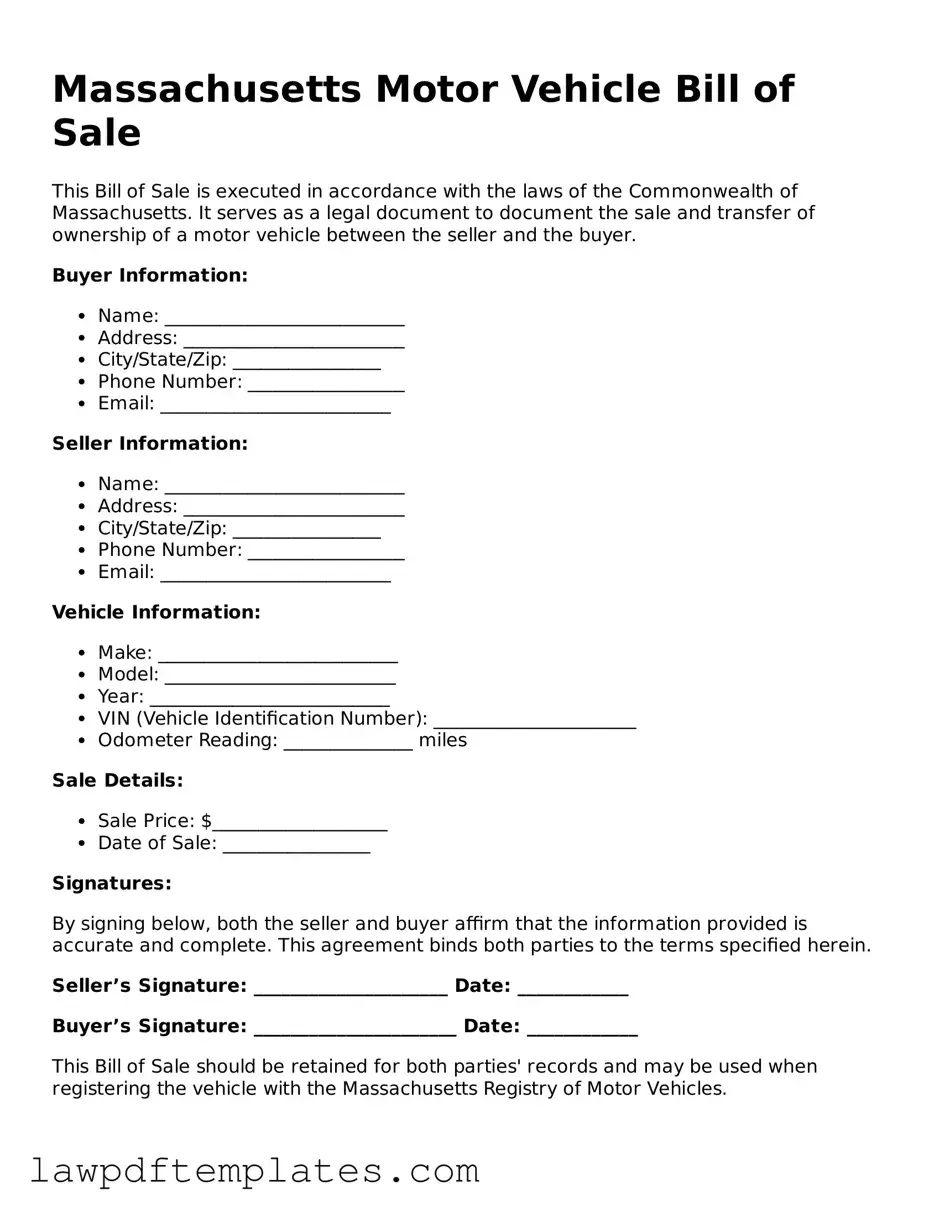Free Motor Vehicle Bill of Sale Template for the State of Massachusetts
Form Breakdown
| Fact Name | Description |
|---|---|
| Purpose | The Massachusetts Motor Vehicle Bill of Sale form is used to document the sale of a vehicle between a buyer and a seller. |
| Governing Law | This form is governed by Massachusetts General Laws Chapter 90, Section 2. |
| Required Information | It must include details such as the vehicle identification number (VIN), make, model, year, and odometer reading. |
| Signatures | Both the seller and the buyer must sign the form to validate the transaction. |
| Notarization | Notarization is not required, but it is recommended for added security and proof of authenticity. |
| Tax Implications | The form is essential for calculating sales tax, which is based on the sale price of the vehicle. |
| Record Keeping | Both parties should keep a copy of the completed form for their records. |
| Transfer of Ownership | This form facilitates the transfer of ownership from the seller to the buyer. |
| Usage in Registration | The completed Bill of Sale is often required when registering the vehicle with the Massachusetts Registry of Motor Vehicles. |
Sample - Massachusetts Motor Vehicle Bill of Sale Form
Massachusetts Motor Vehicle Bill of Sale
This Bill of Sale is executed in accordance with the laws of the Commonwealth of Massachusetts. It serves as a legal document to document the sale and transfer of ownership of a motor vehicle between the seller and the buyer.
Buyer Information:
- Name: __________________________
- Address: ________________________
- City/State/Zip: ________________
- Phone Number: _________________
- Email: _________________________
Seller Information:
- Name: __________________________
- Address: ________________________
- City/State/Zip: ________________
- Phone Number: _________________
- Email: _________________________
Vehicle Information:
- Make: __________________________
- Model: _________________________
- Year: __________________________
- VIN (Vehicle Identification Number): ______________________
- Odometer Reading: ______________ miles
Sale Details:
- Sale Price: $___________________
- Date of Sale: ________________
Signatures:
By signing below, both the seller and buyer affirm that the information provided is accurate and complete. This agreement binds both parties to the terms specified herein.
Seller’s Signature: _____________________ Date: ____________
Buyer’s Signature: ______________________ Date: ____________
This Bill of Sale should be retained for both parties' records and may be used when registering the vehicle with the Massachusetts Registry of Motor Vehicles.
Common mistakes
When filling out the Massachusetts Motor Vehicle Bill of Sale form, many individuals make common mistakes that can lead to complications. One frequent error is failing to provide accurate vehicle identification information. This includes the Vehicle Identification Number (VIN), make, model, and year. Incomplete or incorrect details can cause issues during the registration process.
Another mistake involves neglecting to include the purchase price. The form requires the sale price to be documented clearly. Omitting this information can lead to disputes or difficulties in transferring ownership. Buyers and sellers should ensure that the price is accurately reflected and agreed upon by both parties.
Signatures are crucial on the Bill of Sale. A common oversight is forgetting to sign the document. Both the seller and buyer must provide their signatures to validate the transaction. Without these signatures, the form may be deemed invalid, causing delays in registration.
People also often overlook the date of the sale. This detail is important for legal and record-keeping purposes. Failing to include the date can create confusion regarding when the transaction occurred, which may affect tax liabilities or ownership claims.
Another area where errors frequently occur is in the odometer reading. It's essential to provide an accurate reading at the time of sale. Misreporting the mileage can lead to legal issues and may affect the buyer's perception of the vehicle's value.
Additionally, some individuals do not keep a copy of the completed Bill of Sale. Retaining a copy is important for both the buyer and seller. It serves as proof of the transaction and can be useful for future reference, especially if disputes arise.
Lastly, many people fail to check for additional requirements that may apply to their specific situation. For instance, certain vehicles may require additional documentation, such as a lien release or emissions certificate. It is crucial to research and understand any extra paperwork needed to ensure a smooth transfer of ownership.
Discover More Motor Vehicle Bill of Sale Templates for Specific States
How to Gift a Car in Nj - The Bill of Sale often includes the vehicle identification number (VIN), which is crucial for registration and title transfer.
For those looking to simplify the process of documenting a sale, the Washington Bill of Sale can be easily accessed through resources like PDF Documents Hub, ensuring that all necessary details are captured accurately to protect both parties involved in the transaction.
Do I Need Bill of Sale to Transfer Title - Facilitates a clear understanding of the sale conditions.
